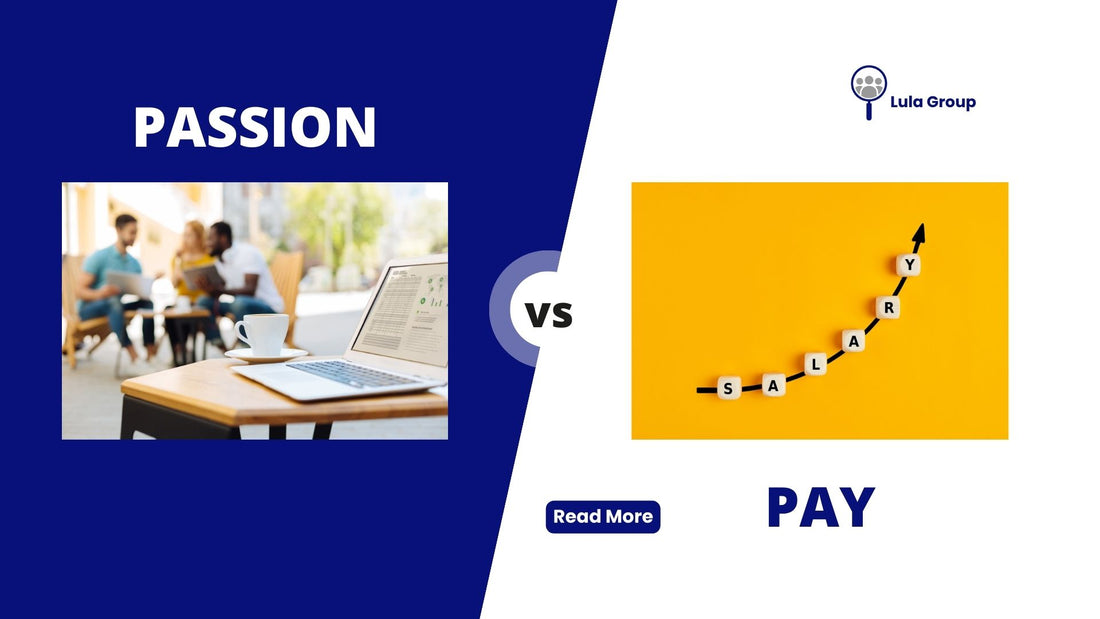The eternal debate of "Passion or pay: What is more important?" has been a topic of contemplation for individuals navigating their career paths. While some prioritise following their passion, others emphasise the significance of financial stability and compensation.
Globally, having a meaningful job or employment is the greatest source of happiness from 43% of respondents in a worldwide happiness survey.
Striking the right balance between pursuing a fulfilling career and meeting financial needs is a complex decision that varies from person to person.
This discussion delves into the nuances of both sides, examining the benefits of pursuing one's passion and the practicality of seeking a well-paying job.
As we explore the intricacies of this debate, we'll consider the impact of passion and pay on job satisfaction, personal fulfillment, and overall life balance.
Defining passion and pay in the context of a career
In the context of a career, "passion" refers to an intense enthusiasm or interest in a particular field, industry, or type of work. It's the driving force that motivates individuals to dedicate their time and effort to something they genuinely enjoy and find fulfilling.
Passionate individuals often feel a strong sense of purpose and engagement, leading to higher job satisfaction and a more meaningful career journey.
On the other hand, "pay" refers to the financial compensation and benefits individuals receive for their work. It's the monetary reward for the skills, expertise, and contributions they bring to their job.
Compensation plays a significant role in a person's financial stability, standard of living, and ability to meet their economic needs and goals.
The debate between passion and pay revolves around whether individuals should prioritise pursuing a career they are passionate about, even if it comes with lower financial compensation, or opt for a well-paying job that might not align with their deepest interests.
Balancing these two factors is a personal decision that depends on various factors, including individual values, life circumstances, and long-term aspirations.
The importance of passion in career satisfaction
Passion plays a crucial role in career satisfaction, contributing to a fulfilling and meaningful work experience.
Here are some reasons why passion is crucial in shaping career satisfaction:
1. Intrinsic Motivation
When individuals are passionate about their work, they are naturally intrinsically motivated. They find joy and fulfilment in the tasks they perform, which leads to higher engagement and satisfaction.
2. Higher Job Satisfaction
Passionate individuals tend to be more satisfied with their jobs because they are aligned with their interests and values. This satisfaction translates into a positive work environment and better mental well-being.
3. Increased Productivity
Passion drives individuals to put in extra effort and go the extra mile in their tasks. This heightened productivity often leads to higher-quality work and a greater sense of accomplishment.
4. Continuous Learning
Passionate individuals are more likely to seek opportunities for learning and growth within their field. They stay updated on industry trends and are eager to acquire new skills, contributing to their career development.
5. Resilience
Passion is a buffer against challenges and setbacks. When individuals love what they do, they are more resilient in the face of difficulties and are more likely to persevere through tough times.
6. Enhanced Creativity
Passion ignites creativity and innovation. Individuals passionate about their work are more likely to have novel solutions and ideas, leading to professional growth and recognition.
7. Personal Fulfilment
Passionate individuals experience a sense of personal fulfilment from their work, contributing to a greater purpose and happiness in their overall lives.
8. Long-Term Commitment
When individuals are driven by passion, they are more likely to commit to their careers for the long term. This commitment can lead to career progression and the development of expertise over time.
The role of pay in career fulfilment
The role of pay or financial compensation in career fulfilment is crucial in the overall job satisfaction equation. While passion and intrinsic motivation are essential, adequate compensation is vital for a well-rounded and fulfilling career experience.
Here's how pay contributes to career fulfilment:
1. Financial Security
Adequate pay provides individuals with financial security, allowing them to meet their basic needs, pay bills, and maintain a certain standard of living. This stability is essential for overall well-being and peace of mind.
2. Reduced Stress
Financial concerns can be a significant source of stress. A well-paying job can alleviate financial stress, allowing individuals to focus more on their work and personal growth.
3. Quality of Life
Higher pay often translates to an improved quality of life. It enables individuals to enjoy leisure activities, pursue hobbies, and invest in personal and professional development.
4. Career Advancement
Adequate compensation can incentivise individuals to stay with an organisation and work toward career advancement. As they progress, their pay increases, enhancing their overall career satisfaction.
5. Motivation and Commitment
Competitive compensation can motivate individuals to perform at their best and commit to their roles. When they feel their efforts are rewarded, they are more likely to invest in their work.
6. Job Market Value
Compensation can reflect an individual's market value and the demand for their skills and expertise. Being paid appropriately can boost confidence and reinforce one's sense of worth in the job market.
7. Freedom and Choices
Higher pay provides individuals with more financial freedom and choices. They can save, invest, and plan for their future, allowing them to make decisions that align with their long-term goals.
8. Job Satisfaction
Individuals who are compensated fairly are more likely to experience job satisfaction. Feeling valued and respected through compensation can enhance overall job happiness.
Read: Top 10 skills employers are looking for in 2023
Balancing passion and pay: Finding the sweet spot
Balancing passion and pay is a delicate art that requires careful consideration and strategic decision-making. Striking the right balance between pursuing what you love and meeting your financial needs is crucial for a fulfilling and sustainable career.
Here's how you can find the sweet spot between passion and pay:
1. Identify Your Values
Reflect on your core values, both personally and professionally. Determine what aspects of your work are non-negotiable and align with your values.
2. Assess Your Passion
Evaluate how deeply passionate you are about your chosen field. Consider whether your passion is strong enough to withstand challenges and uncertainties.
3. Set Clear Goals
Define your short-term and long-term career goals. Consider how pursuing your passion and achieving financial stability fit into these goals.
4. Research Salary Expectations
Research the salary range for your desired role and industry. This will give you a realistic understanding of the financial aspect of your chosen path.
Read: The future of salaries in 2023
5. Evaluate Lifestyle Needs
Assess your lifestyle needs and financial obligations. Consider living expenses, debt, savings, and long-term financial goals.
6. Seek Compromise
Find a job or look for roles and industries that compromise your passion and financial requirements. This might involve finding a job that allows you to incorporate your passion to some extent.
7. Explore Hybrid Paths
Consider hybrid roles that allow you to combine your passion with a skill set that is in demand and well-compensated.
8. Continuing Education
Invest in skills development and education to enhance your expertise and marketability. This can lead to better-paying opportunities within your passion-driven field.
9. Financial Planning
Create a financial plan that outlines your income, expenses, and savings goals. Having a clear financial roadmap can help you make informed decisions.
10. Flexibility and Adaptability
Be open to adjusting your career path based on changing circumstances. Adaptability can help you navigate shifts in the job market and industry trends.
11. Prioritise Well-Being
Consider how a balanced approach to passion and pay impacts your overall well-being. Striving for balance can lead to a healthier work-life equilibrium.
12. Seek Mentorship
Seek guidance from mentors who have successfully balanced passion and pay in their careers. Their insights can provide valuable perspectives.
13. Regular Self-Assessment
Periodically reassess your career path, goals, and financial situation. Adjustments might be necessary as your circumstances evolve.
Assessing your priorities: Passion vs. pay
Assessing your priorities to balance passion and pay is critical in making informed career decisions.
Here's how to evaluate your priorities and determine what matters most to you:
1. Self-Reflection
Take time to reflect on your personal values, interests, and long-term goals. Consider what truly motivates you and brings you a sense of fulfilment.
2. Passion Assessment
Evaluate the level of passion you have for your chosen field or industry. Ask yourself if you are genuinely excited and engaged when working on tasks related to your passion.
3. Financial Needs
Determine your current financial situation and future financial goals. Consider factors like living expenses, debts, savings targets, and your desired lifestyle.
4. Career Goals
Define your career goals and aspirations. Determine if your passion aligns with these goals and how compensation factors into your desired career trajectory.
5. Personal Fulfilment
Consider how pursuing your passion contributes to your overall personal fulfilment and happiness.
6. Negotiable and Non-Negotiable Factors
Identify aspects of your career that are negotiable (e.g., specific job roles, industries) and non-negotiable (e.g., work-life balance, values).
7. Risk Tolerance
Evaluate your comfort level with uncertainty and risk. Pursuing a passion might involve more risk, especially if it leads to a less stable financial situation.
8. Alignment with Values
Determine if your chosen path aligns with your core values. Passionate pursuits that resonate with your values can lead to greater career satisfaction.
9. External Influences
Reflect on external factors such as societal expectations, family considerations, and cultural influences that may affect your priorities.
Embracing a career that brings both passion and pay
In the intricate dance between passion and pay, the ultimate goal is to find a career that seamlessly blends both elements, creating a fulfilling and prosperous professional journey.
While pursuing passion fuels our sense of purpose and ignites our enthusiasm, the importance of financial stability and security cannot be understated.
The journey of finding the perfect equilibrium between the two is personal, guided by your values, aspirations, and unique circumstances.
Embracing a career that brings both passion and pay requires a thoughtful approach. It demands self-reflection, strategic planning, and a willingness to explore various avenues.
Ultimately, finding a career that marries your passion with financial well-being is not just a dream; it's an achievable reality. By embracing a holistic approach that considers passion and pay, you create a professional journey that resonates deeply with your heart and rewards you tangibly.
If you need professional career guidance, you can contact us now. Don't forget to subscribe to our Career Chronicles newsletter for more insights.




